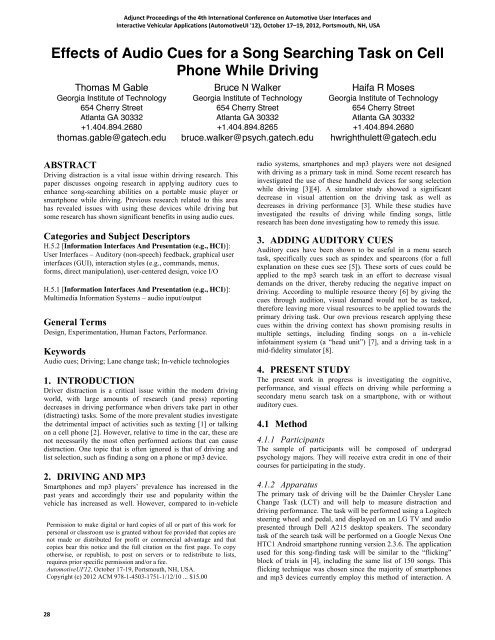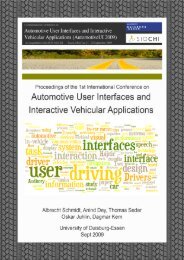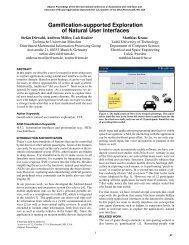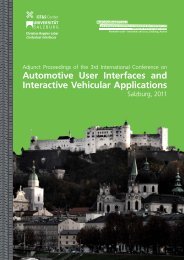12: Adjunct Proceedings - Automotive User Interfaces and ...
12: Adjunct Proceedings - Automotive User Interfaces and ...
12: Adjunct Proceedings - Automotive User Interfaces and ...
You also want an ePaper? Increase the reach of your titles
YUMPU automatically turns print PDFs into web optimized ePapers that Google loves.
Effects of Audio Cues for a Song Searching Task on Cell<br />
Phone While Driving<br />
Thomas M Gable<br />
Georgia Institute of Technology<br />
654 Cherry Street<br />
Atlanta GA 30332<br />
+1.404.894.2680<br />
thomas.gable@gatech.edu<br />
ABSTRACT<br />
Driving distraction is a vital issue within driving research. This<br />
paper discusses ongoing research in applying auditory cues to<br />
enhance song-searching abilities on a portable music player or<br />
smartphone while driving. Previous research related to this area<br />
has revealed issues with using these devices while driving but<br />
some research has shown significant benefits in using audio cues.<br />
Categories <strong>and</strong> Subject Descriptors<br />
H.5.2 [Information <strong>Interfaces</strong> And Presentation (e.g., HCI)]:<br />
<strong>User</strong> <strong>Interfaces</strong> – Auditory (non-speech) feedback, graphical user<br />
interfaces (GUI), interaction styles (e.g., comm<strong>and</strong>s, menus,<br />
forms, direct manipulation), user-centered design, voice I/O<br />
H.5.1 [Information <strong>Interfaces</strong> And Presentation (e.g., HCI)]:<br />
Multimedia Information Systems – audio input/output<br />
General Terms<br />
Design, Experimentation, Human Factors, Performance.<br />
Keywords<br />
Audio cues; Driving; Lane change task; In-vehicle technologies<br />
1. INTRODUCTION<br />
Driver distraction is a critical issue within the modern driving<br />
world, with large amounts of research (<strong>and</strong> press) reporting<br />
decreases in driving performance when drivers take part in other<br />
(distracting) tasks. Some of the more prevalent studies investigate<br />
the detrimental impact of activities such as texting [1] or talking<br />
on a cell phone [2]. However, relative to time in the car, these are<br />
not necessarily the most often performed actions that can cause<br />
distraction. One topic that is often ignored is that of driving <strong>and</strong><br />
list selection, such as finding a song on a phone or mp3 device.<br />
2. DRIVING AND MP3<br />
Smartphones <strong>and</strong> mp3 players’ prevalence has increased in the<br />
past years <strong>and</strong> accordingly their use <strong>and</strong> popularity within the<br />
vehicle has increased as well. However, compared to in-vehicle<br />
Permission to make digital or hard copies of all or part of this work for<br />
personal or classroom use is granted without fee provided that copies are<br />
not made or distributed for profit or commercial advantage <strong>and</strong> that<br />
copies bear this notice <strong>and</strong> the full citation on the first page. To copy<br />
otherwise, or republish, to post on servers or to redistribute to lists,<br />
requires prior specific permission <strong>and</strong>/or a fee.<br />
<strong>Automotive</strong>UI'<strong>12</strong>, October 17-19, Portsmouth, NH, USA.<br />
Copyright (c) 20<strong>12</strong> ACM 978-1-4503-1751-1/<strong>12</strong>/10 ... $15.00<br />
28<br />
<strong>Adjunct</strong> <strong>Proceedings</strong> of the 4th International Conference on <strong>Automotive</strong> <strong>User</strong> <strong>Interfaces</strong> <strong>and</strong><br />
Interactive Vehicular Applications (<strong>Automotive</strong>UI '<strong>12</strong>), October 17–19, 20<strong>12</strong>, Portsmouth, NH, USA<br />
Bruce N Walker<br />
Georgia Institute of Technology<br />
654 Cherry Street<br />
Atlanta GA 30332<br />
+1.404.894.8265<br />
bruce.walker@psych.gatech.edu<br />
Haifa R Moses<br />
Georgia Institute of Technology<br />
654 Cherry Street<br />
Atlanta GA 30332<br />
+1.404.894.2680<br />
hwrighthulett@gatech.edu<br />
radio systems, smartphones <strong>and</strong> mp3 players were not designed<br />
with driving as a primary task in mind. Some recent research has<br />
investigated the use of these h<strong>and</strong>held devices for song selection<br />
while driving [3][4]. A simulator study showed a significant<br />
decrease in visual attention on the driving task as well as<br />
decreases in driving performance [3]. While these studies have<br />
investigated the results of driving while finding songs, little<br />
research has been done investigating how to remedy this issue.<br />
3. ADDING AUDITORY CUES<br />
Auditory cues have been shown to be useful in a menu search<br />
task, specifically cues such as spindex <strong>and</strong> spearcons (for a full<br />
explanation on these cues see [5]). These sorts of cues could be<br />
applied to the mp3 search task in an effort to decrease visual<br />
dem<strong>and</strong>s on the driver, thereby reducing the negative impact on<br />
driving. According to multiple resource theory [6] by giving the<br />
cues through audition, visual dem<strong>and</strong> would not be as tasked,<br />
therefore leaving more visual resources to be applied towards the<br />
primary driving task. Our own previous research applying these<br />
cues within the driving context has shown promising results in<br />
multiple settings, including finding songs on a in-vehicle<br />
infotainment system (a “head unit”) [7], <strong>and</strong> a driving task in a<br />
mid-fidelity simulator [8].<br />
4. PRESENT STUDY<br />
The present work in progress is investigating the cognitive,<br />
performance, <strong>and</strong> visual effects on driving while performing a<br />
secondary menu search task on a smartphone, with or without<br />
auditory cues.<br />
4.1 Method<br />
4.1.1 Participants<br />
The sample of participants will be composed of undergrad<br />
psychology majors. They will receive extra credit in one of their<br />
courses for participating in the study.<br />
4.1.2 Apparatus<br />
The primary task of driving will be the Daimler Chrysler Lane<br />
Change Task (LCT) <strong>and</strong> will help to measure distraction <strong>and</strong><br />
driving performance. The task will be performed using a Logitech<br />
steering wheel <strong>and</strong> pedal, <strong>and</strong> displayed on an LG TV <strong>and</strong> audio<br />
presented through Dell A215 desktop speakers. The secondary<br />
task of the search task will be performed on a Google Nexus One<br />
HTC1 Android smartphone running version 2.3.6. The application<br />
used for this song-finding task will be similar to the “flicking”<br />
block of trials in [4], including the same list of 150 songs. This<br />
flicking technique was chosen since the majority of smartphones<br />
<strong>and</strong> mp3 devices currently employ this method of interaction. A





